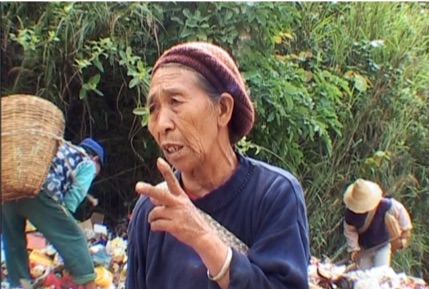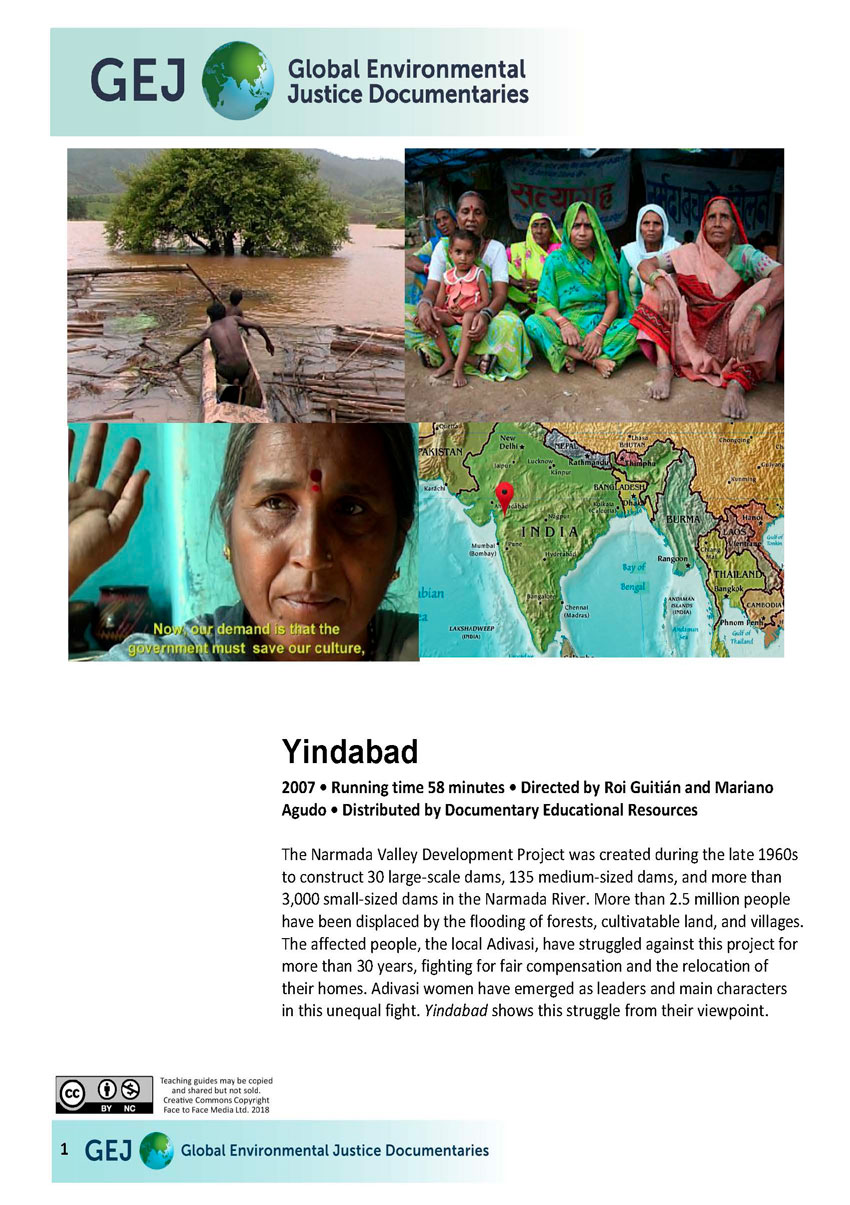Curator
 — Rajashree Ghosh, Resident scholar, Women's Studies Research Center and lecturer, Environmental Studies program, Brandeis University
— Rajashree Ghosh, Resident scholar, Women's Studies Research Center and lecturer, Environmental Studies program, Brandeis University
Yindabad
Yindabad is a poignant chronicle of the dynamic struggles of the displaced indigenous peoples living by the Narmada River in India.

Curator
This film was selected by Rajashree Ghosh, Resident scholar, Women’s Studies Research Center and lecturer, Environmental Studies program, Brandeis University
Why I chose this film
Yindabad is a poignant chronicle of the dynamic struggles of the displaced indigenous peoples living by the Narmada River in India. This unique film presents compelling facts and lived experiences of people displaced by large development projects. Furthermore, it provides opportunities for debates on gender and displacement and impoverishment in the light of globalization and market forces. Most of all, the film is a potential teaching tool for developing a lens on alternative and emerging people’s movements and scholarship on environmental and social justice.
Teacher's guide
Please see the teacher's guide for maps, background information and suggested subjects, questions and activities.
Synopsis
The Narmada River, the fifth-largest river in India, flows through three states—Madhya Pradesh, Maharashtra, and Gujarat—on its way to the Gulf of Cambay. The total length of the river from source to sea is 1,312 kilometers (815 miles). The film captures the essence of the lives and culture of the indigenous Adivasi who live by the river, showing their inextricable connection with their environment, including the pristine waters of the Narmada.
The construction of the planned 30 large dams, 135 medium, and 3,000 small dams on the river has wreaked havoc on the ecosystem and on the 2.5 million people, mostly indigenous Adivasi, who live by the river. Their land, homes, and livelihood have been submerged underwater. As compensation, many Adivasi, now dispossessed of their ancestral land, have been resettled in areas that bear no resemblance to their native habitat, causing them to lose their livelihood and their cultural identity at the same time.
The documentary shows how activist Medha Patkar has spearheaded a movement of women and men from these indigenous communities. Together, they are committed to bringing about social change and empowerment and preventing further construction of the dams. Taken in a wider context, Yindabad explores the conflict between indigenous communities and a destructive state that promotes corporate development projects that strip the poor of their right to their livelihood.
Environmental Justice Focus
Yindabad draws attention to the key issues in the fraught relationship between development and marginalization. The indigenous population (the Adivasi) of central India have been engaged in a struggle for the past three decades with the Narmada Valley Development Project, a plan to construct hundreds of large to mid-sized dams on the Narmada River. Over 2.5 million people have been displaced by the flooding of forests, cultivable land, and villages.
The indigenous women and men find their role as erstwhile custodians of ancestral land and biodiversity dismissed. The film illustrates that forced displacement is the result of market-induced injustice, the apathy of the government, and the power and influence of large corporations. In presenting people’s lived experiences, their loss of livelihood, and the denudation of the environment, the film gives them a voice and visibility critical in providing avenues for knowledge and change.
No reviews available.
Awards
Awards 2007-2008
2007 Water Prize, 13 CineEco Festival, Serra da Estrela, Portugal,
Personal Stories Special Prize, International "Water and Film" Events, Istanbul,
Rights of Indigenous People Award, IX Festival Int'l de Cine y Video de los Pueblos Indígenas, La Paz, Bolivia,
Festivals 2007-2010
La Imagen del Sur Film Festival, Cordoba,Spain,
Medimed, Mediteranean Documentary Market Muestra Internacional de Cine y Derechos Humanos - Argentina, Ecuador, Spain, Guatemala, Mexico,
Muestra de Cine de Cooperacion Internacional de Balears, Spain,
Festival de Cine de Ponferrada, León, Spain,
Liberty Festival, Belgium
Document5, International Human Rights Documentary Film Festival, Glasgow, Scotland,
Docusur, Granada Festival de Cine de Colomera, Spain,
Festival Internacional de Video i Arts Digitals, Spain,
9th Maduri Film Festival, India,
4th International Film Festival, Bangladesh,
Slow Film Festival
Eger, Hungary
Environmental Film Festival, Washington DC,
Ecobahia, Brazil,
Viscult - International Festival of Visual Culture, Finland,
Festival du Film de Dakar, Senegal
FIDA DOC-SOUSS, Interational du Film Documentaire d?Agadir, Morocco,
Muestra Internacional de Cine y Derechos Humanos, Argentina, Ecuador, Spain, Guatemala and Mexico, Festivals de Cine Pobre de Cuba,
Festival Internacional Cine y Medio Ambiente de Catalunya (FICMAC),
Green Film Festival Seoul, Korea,
Nepal International Indigenous Film Festival,
AAA/Society for Visual Anthropology Film, Video & Multimedia Festival,
Reel Awareness Human Rights Film Festival, Toronto, Canada
Citation
Main credits
Agudo, Mariano (film director)
Agudo, Mariano (screenwriter)
Agudo, Mariano (photographer)
Guitián, Roi (film director)
Guitián, Roi (screenwriter)
Other credits
Montaje, María Lobo; música, Enrique De Justo; photography, Mariano Agudo.
Distributor credits
Maria Lobo
Mariano Agudo and Roi Guitián
Filmmakers – Mariano Agudo, Roi Guitián
Producer – Maria Lobo
Executive Producer – Miguel Paredes
Music by – Enrique de Justo
Cinematography by – Mariano Agudo
Film Editing – Maria Lobo
Docuseek subjects
Rivers and Lakes
Environmental Justice
Sustainability
Water
Women's Studies
Geography
Indigenous Studies
Dams and Hydroelectricity
Poverty
Community
India
Environmental Geography
Distributor subjects
Anthropology
social rights movement
women
natural resources
ecology
globalisation
gender
gender studies
women
Keywords
Welcome to Docuseek2!
Docuseek2 is a streaming platform of the best documentary and social issue films available for the higher education community.
Anyone may search for titles and find detailed information about the titles. To preview films or license them for streaming, you must register and login.
Currently, we support online registration for anyone affiliated with a higher education institution. Please inquire if you are with a K-12 district or school or with a public library.
Click the Close button to get started!



